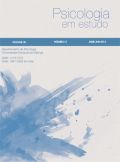RESIDÊNCIA TERAPÊUTICA: PERMANÊNCIAS E RUPTURAS NAS PRÁTICAS DE TRABALHO
Résumé
No Brasil, o funcionamento das residências terapêuticas tende a apresentar desafios, tais como a falta de apoio social, que podem dificultar a produção do cuidado em saúde e afetar os trabalhadores do serviço. Por isso, a presente pesquisa tem como objetivo relatar a experiência de realização de oficinas com profissionais de uma residência terapêutica, além de descrever os desafios e potencialidades enfrentados pelos profissionais ao produzirem o cuidado em saúde. Para tanto, realizou-se um estudo qualitativo-descritivo, do tipo relato de experiência, embasado na abordagem metodológica do construcionismo social. Os dados foram coletados a partir de entrevistas semiestruturadas, gravadas, com cinco profissionais de uma residência terapêutica, seguidas por quatro oficinas, adaptadas a partir da Metodologia ‘Ritmos da Vida’, e diários de campo da pesquisadora. A partir dos relatos apresentados percebe-se que as participantes do estudo relataram muito mais desafios do que potencialidades para a produção do cuidado em saúde mental. Contudo, os espaços de fala e de escuta ofertados às profissionais parecem ter disponibilizado reflexões que possibilitaram a construção de sentidos positivos relacionados ao trabalho em saúde mental.
Palavras-chave: Serviços de saúde mental; pessoal da saúde mental; grupos.
Téléchargements
Copyright (c) 2022 Psicologia em Estudo

Ce travail est disponible sous la licence Creative Commons Attribution 4.0 International .
As opiniões emitidas, são de exclusiva responsabilidade do(s) autor(es). Ao submeterem o manuscrito ao Conselho Editorial de Psicologia em Estudo, o(s) autor(es) assume(m) a responsabilidade de não ter previamente publicado ou submetido o mesmo manuscrito por outro periódico. Em caso de autoria múltipla, o manuscrito deve vir acompanhado de autorização assinada por todos os autores. Artigos aceitos para publicação passam a ser propriedade da revista, podendo ser remixados e reaproveitados conforme prevê a licença Creative Commons CC-BY.
The opinions expressed are the sole responsibility of the author (s). When submitting the manuscript to the Editorial Board of Study Psychology, the author (s) assumes responsibility for not having previously published or submitted the same manuscript by another journal. In case of multiple authorship, the manuscript must be accompanied by an authorization signed by all authors. Articles accepted for publication become the property of the journal, and can be remixed and reused as provided for in theby a license Creative Commons CC-BY.
















